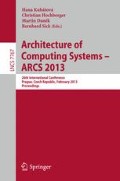Abstract
Temperature profile optimization is one of the most relevant and challenging problems in modern multi-core architectures. Several Dynamic Thermal Management approaches have been proposed in literature, and run-time policies have been designed to direct the allocation of tasks according to temperature constraints. Thermal coupling is recognized to have a role of paramount importance in determining the thermal envelope of the processor, nevertheless several works in literature do not take directly into account this aspect while determining the status of the system at run-time. Without this information, the DTM design is not able to fully redistribute the roles that each core have on the system-level temperature, thus neglecting important information for temperature-constrained workload allocation.
Purpose of this work is to provide a novel mechanism to better support DTM policies, focusing on the estimation of the impact of thermal coupling in determining the appropriate status from a thermal stand-point. The presented approach is based on two stages: off-line characterization of the target architecture estimates thermal coupling coefficients, that will be used at run-time for proper DTM decisions.
Access this chapter
Tax calculation will be finalised at checkout
Purchases are for personal use only
Preview
Unable to display preview. Download preview PDF.
References
Lasance, C.J.M.: Thermally driven reliability issues in microelectronic systems: status-quo and challenges. Microelectronics Reliability 43(12), 1969–1974 (2003)
Ajami, A., Banerjee, K., Pedram, M.: Modeling and analysis of nonuniform substrate temperature effects on global ULSI interconnects. IEEE Transactions on Computer-Aided Design of Integrated Circuits and Systems 24(6), 849–861 (2005)
Janicki, M., Collet, J.H., Louri, A., Napieralski, A.: Hot spots and core-to-core thermal coupling in future multi-core architectures. In: 2010 26th Annual IEEE Semiconductor Thermal Measurement and Management Symposium (SEMI-THERM), pp. 205–210. IEEE (2010)
Incropera, F.P., DeWitt, D.P., Bergman, T.L., Lavine, A.S.: Fundamentals of heat and mass transfer. Wiley (2007)
International Technology Roadmap for Semiconductor, Design chapter (2010), http://www.itrs.net/
Alam, M., Kang, K., Paul, B., Roy, K.: Reliability- and process-variation aware design of vlsi circuits. In: 14th International Symposium on the Physical and Failure Analysis of Integrated Circuits, IPFA 2007, pp. 17–25 (July 2007)
Brooks, D., Martonosi, M.: Dynamic Thermal Management for High-Performance Microprocessors. In: 17th International Symposium on High Performance Computer Architecture, HPCA 2001 (2001)
Siozios, K., Rodopoulos, D., Soudris, D.: Quick_hotspot: A software supported methodology for supporting run-time thermal analysis at mpsoc designs. In: 23rd International Conference on Architecture of Computing Systems, ARCS 2011 (2011)
Gomaa, M., Powell, M., Vijaykumar, T.: Heat-and-run: leveraging smt and cmp to manage power density through the operating system. In: Proceedings of the 11th International Conference on Architectural Support for Programming Languages and Operating Systems, ASPLOS-XI, pp. 260–270. ACM, New York (2004)
Donald, J., Martonosi, M.: Techniques for Multicore Thermal Management: Classification and New Exploration. In: 33rd International Symposium on Computer Architecture, ISCA 2006 (2006)
Yang, J., Zhou, X., Chrobak, M., Zhang, Y., Jin, L.: Dynamic thermal management through task scheduling. In: IEEE International Symposium on Performance Analysis of Systems and Software, ISPASS 2008, pp. 191–201 (April 2008)
Srinivasan, J., Adve, S.V.: Predictive dynamic thermal management for multimedia applications. In: Proceedings of the 17th Annual International Conference on Supercomputing, ICS 2003 (2003)
Yeo, I., Liu, C.C., Kim, E.J.: Predictive dynamic thermal management for multicore systems. In: Proceedings of the 45th Annual Design Automation Conference, DAC 2008, pp. 734–739. ACM, New York (2008)
Author information
Authors and Affiliations
Editor information
Editors and Affiliations
Rights and permissions
Copyright information
© 2013 Springer-Verlag Berlin Heidelberg
About this paper
Cite this paper
Corbetta, S., Fornaciari, W. (2013). Exploiting Thermal Coupling Information in MPSoC Dynamic Thermal Management. In: Kubátová, H., Hochberger, C., Daněk, M., Sick, B. (eds) Architecture of Computing Systems – ARCS 2013. ARCS 2013. Lecture Notes in Computer Science, vol 7767. Springer, Berlin, Heidelberg. https://doi.org/10.1007/978-3-642-36424-2_5
Download citation
DOI: https://doi.org/10.1007/978-3-642-36424-2_5
Publisher Name: Springer, Berlin, Heidelberg
Print ISBN: 978-3-642-36423-5
Online ISBN: 978-3-642-36424-2
eBook Packages: Computer ScienceComputer Science (R0)

